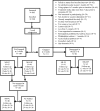Effect of patient choice in an adaptive sequential randomization trial of treatment for alcohol and cocaine dependence
- PMID: 26214544
- PMCID: PMC5823027
- DOI: 10.1037/a0039534
Effect of patient choice in an adaptive sequential randomization trial of treatment for alcohol and cocaine dependence
Abstract
Objective: To evaluate the effect of providing choice of treatment alternatives to patients who fail to engage in or drop out of intensive outpatient programs (IOPs) for substance dependence.
Method: Alcohol- and/or cocaine-dependent patients (N = 500) participated in a sequential, multiple-assignment, randomized trial (SMART). Those who failed to engage in an IOP at Week 2 (N = 189) or who dropped out after engagement (N = 84) were randomized for motivational-interviewing (MI) telephone calls that focused on engagement in an IOP (MI-IOP) or provided a choice of IOP type or 3 treatment options (MI-PC, or patient choice). Those not engaged at both 2 and 8 weeks (N = 102) were re-randomized either to MI-PC or no further outreach. Outcomes were treatment attendance and measures of alcohol and cocaine use obtained at 1, 2, 3, and 6 months.
Results: MI-PC produced better attendance than comparison conditions in patients who dropped out after initial engagement and in those re-randomized at 8 weeks. However, contrary to study hypotheses, MI-IOP produced significantly better alcohol-use outcomes than MI-PC in alcohol-dependent patients not engaged at Week 2. There were no other significant differences between treatment conditions on other main-effect analyses with alcohol- or cocaine-outcome measures.
Conclusion: Providing treatment options via telephone calls to patients who failed to engage in IOP did not produce better substance-use outcomes than outreach calls focused on engagement in IOP. Future researchers should investigate the potential benefits of choice at other points in treatment (e.g., at intake) as well as choice of other combinations of treatments.
(c) 2015 APA, all rights reserved).
Figures



Similar articles
-
A randomized trial of extended telephone-based continuing care for alcohol dependence: within-treatment substance use outcomes.J Consult Clin Psychol. 2010 Dec;78(6):912-23. doi: 10.1037/a0020700. J Consult Clin Psychol. 2010. PMID: 20873894 Free PMC article. Clinical Trial.
-
The effectiveness of telephone-based continuing care for alcohol and cocaine dependence: 24-month outcomes.Arch Gen Psychiatry. 2005 Feb;62(2):199-207. doi: 10.1001/archpsyc.62.2.199. Arch Gen Psychiatry. 2005. PMID: 15699297 Clinical Trial.
-
Do patient characteristics and initial progress in treatment moderate the effectiveness of telephone-based continuing care for substance use disorders?Addiction. 2005 Feb;100(2):216-26. doi: 10.1111/j.1360-0443.2005.00972.x. Addiction. 2005. PMID: 15679751 Clinical Trial.
-
Enhanced continuing care provided in parallel to intensive outpatient treatment does not improve outcomes for patients with cocaine dependence.J Stud Alcohol Drugs. 2013 Jul;74(4):642-51. doi: 10.15288/jsad.2013.74.642. J Stud Alcohol Drugs. 2013. PMID: 23739030 Free PMC article. Clinical Trial.
-
Who benefits from extended continuing care for cocaine dependence?Addict Behav. 2014 Mar;39(3):660-8. doi: 10.1016/j.addbeh.2013.11.019. Epub 2013 Dec 1. Addict Behav. 2014. PMID: 24355401 Free PMC article. Clinical Trial.
Cited by
-
Noninferiority and equivalence tests in sequential, multiple assignment, randomized trials (SMARTs).Psychol Methods. 2020 Apr;25(2):182-205. doi: 10.1037/met0000232. Epub 2019 Sep 9. Psychol Methods. 2020. PMID: 31497981 Free PMC article.
-
Estimating Joint Health State Utility Algorithms Under Partial Information.Value Health. 2023 May;26(5):742-749. doi: 10.1016/j.jval.2022.09.009. Epub 2022 Oct 26. Value Health. 2023. PMID: 36307281 Free PMC article.
-
Comparing cluster-level dynamic treatment regimens using sequential, multiple assignment, randomized trials: Regression estimation and sample size considerations.Stat Methods Med Res. 2017 Aug;26(4):1572-1589. doi: 10.1177/0962280217708654. Epub 2017 Jun 19. Stat Methods Med Res. 2017. PMID: 28627310 Free PMC article.
-
The Unsolved Problem of Attrition Rates on Randomized Clinical Trials for Cocaine Use Disorders: A Scoping Review.Subst Use Addctn J. 2025 Jul;46(3):757-782. doi: 10.1177/29767342251326374. Epub 2025 May 5. Subst Use Addctn J. 2025. PMID: 40322882 Free PMC article.
-
Sample size estimation for comparing dynamic treatment regimens in a SMART: A Monte Carlo-based approach and case study with longitudinal overdispersed count outcomes.Stat Methods Med Res. 2023 Jul;32(7):1267-1283. doi: 10.1177/09622802231167435. Epub 2023 May 11. Stat Methods Med Res. 2023. PMID: 37167008 Free PMC article.
References
-
- Adamson SJ, Sellman JD, Dore GM. Therapy preference and treatment outcome in clients with mild to moderate alcohol dependence. Drug and Alcohol Review. 2005;24:209–216. - PubMed
-
- Babor TF, Steinberg K, Anton R, Del Boca F. Talk is cheap: Measuring drinking outcomes in clinical trials. Journal of Studies on Alcohol. 2000;61:55–63. - PubMed
-
- Carroll KM. A cognitive-behavioral approach: Treating cocaine addiction. Rockville, MD: National Institute on Drug Abuse; 1998. (NIH publication 98-4308).
Publication types
MeSH terms
Grants and funding
LinkOut - more resources
Full Text Sources
Other Literature Sources
Medical

